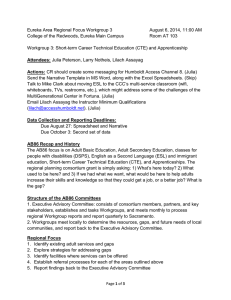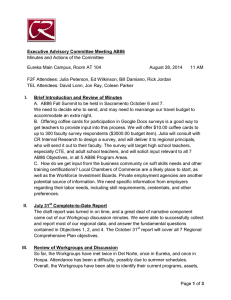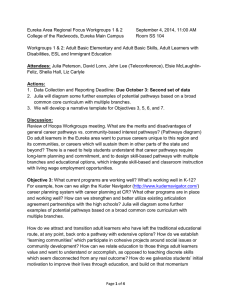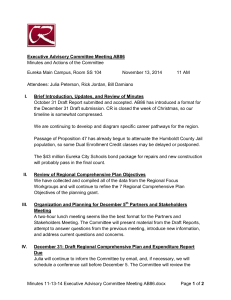Minutes and Actions of the Committee October 23, 2014
advertisement
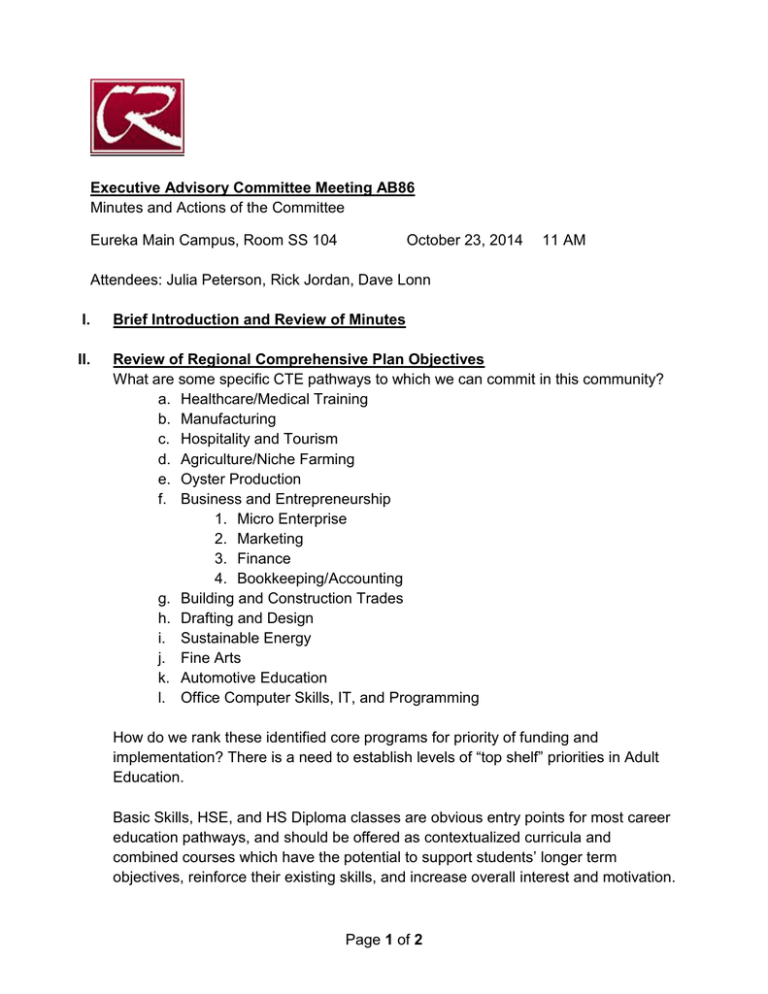
Executive Advisory Committee Meeting AB86 Minutes and Actions of the Committee Eureka Main Campus, Room SS 104 October 23, 2014 11 AM Attendees: Julia Peterson, Rick Jordan, Dave Lonn I. Brief Introduction and Review of Minutes II. Review of Regional Comprehensive Plan Objectives What are some specific CTE pathways to which we can commit in this community? a. Healthcare/Medical Training b. Manufacturing c. Hospitality and Tourism d. Agriculture/Niche Farming e. Oyster Production f. Business and Entrepreneurship 1. Micro Enterprise 2. Marketing 3. Finance 4. Bookkeeping/Accounting g. Building and Construction Trades h. Drafting and Design i. Sustainable Energy j. Fine Arts k. Automotive Education l. Office Computer Skills, IT, and Programming How do we rank these identified core programs for priority of funding and implementation? There is a need to establish levels of “top shelf” priorities in Adult Education. Basic Skills, HSE, and HS Diploma classes are obvious entry points for most career education pathways, and should be offered as contextualized curricula and combined courses which have the potential to support students’ longer term objectives, reinforce their existing skills, and increase overall interest and motivation. Page 1 of 2 III. AB86 Summit Report Our Consortium was well represented by Julia Peterson (College Administrator), Jay Dragna (College Faculty), Coleen Parker (K-12 Administrator), and Robert Parker (K-12 Faculty). The group was able to cover a variety of topics in the breakout sessions. There was very little feedback from the summit organizers, but they were receptive to the various discussions and reporting from the regional consortia. The location of the summit promoted a large turnout, which allowed for broad representation from rural areas similar to our Consortium region, and with whom we share many common needs and gaps. Among these are reliable high-speed internet service, subsidies for smaller class size, transportation assistance, and childcare for students. ESL has experienced the biggest decline in funding since 2008, followed by GED preparation. There will be $200 – 500 million available for implementation funding in July 2015, which will appear in the Governor’s January budget. No further details are available at this time, and the direction of this Committee is to keep working and moving forward. The Governor and the Legislature remain committed to redefining Adult Education in California. The Workgroups are all in favor of expanded collaborative professional development in order to train and retrain faculty and other providers in all aspects of adult learning. There is a perceived need to recruit young, open-minded, and innovative faculty and staff at every level in order to move beyond outdated methods and models of instruction. What are other colleges doing? Need to look at Santa Barbara Community College. Need to study established pathways and develop parallel pathways graphics. Basic pathways could start with HS Juniors and take students all the way through Undergraduate, Graduate, and Professional Schools. IV. Discussion Having gathered data from the Workgroups for several months, the Committee would like to see a clear, concise, and comprehensive plan to address the Adult Education needs of the North Coast region through the planning grant objectives. V. Next Steps a. Regional Comprehensive Plan (Completed-to-Date) and Expenditure Report Due: October 31, 2014 b. Next Executive Advisory Committee Meeting: November 13, 2014 c. Partners and Stakeholders Meeting: December 5, 2014 Page 2 of 2
